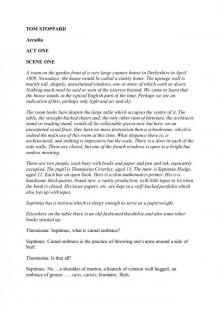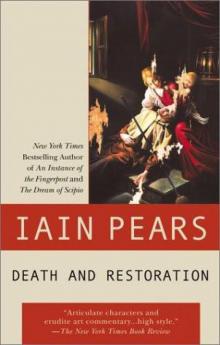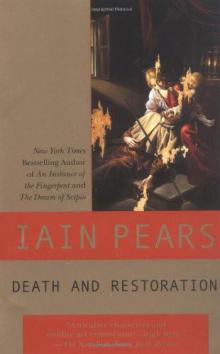- Home
- Iain Pears
Death & Restoration ja-6 Page 6
Death & Restoration ja-6 Read online
Page 6
Argyll was beginning to feel uncomfortable. These sorts of conversations always had this effect on him, a slight feeling of claustrophobia and a desperate desire to be somewhere else. He didn’t want to encourage her to talk on, but didn’t want to be rude either, so he hopped up and down and said, “Ah, indeed,” in a noncommittal way.
“They won’t let people in any more; it’s so sad and so foolish. The church used to be open for supplicants, who needed to come and ask her a favour. Or who wanted to thank her.”
“Ah.”
“And now only I am let in. I tend to her …”
“Morning!” A voice boomed and echoed across the church like an old cannon being fired, and simultaneously a bright shaft of sunlight cut across the loom of the church like a knife. Dan Menzies had walked through the door. “Ciao, signora,” he said cheerfully to the cleaner. “How are you this morning?”’
“Good morning, sir,” she said politely, then picked up her bucket and walked off to restart her work. Menzies made a face at Argyll and shrugged. No dealing with some people, he seemed to say.
“Who are you?”’
Argyll began his explanation as Menzies pulled out a key ring from his pocket and gestured at the temporary wall put across the transept. “I’ve seen you around. At the university, right? Come in, come in. Come and see the mess I’m making, if you must. Trying to prove it’s by Caravaggio, are you?”’
“Or not.”
“Not, in my opinion.”
“Why do you say that?”’
He shook his head. “The style’s OK. But it’s not good enough. Although there was so much nineteenth-century overpainting there’s not a lot of the original left. Why don’t you write about that? The nineteenth-century destruction of Italy’s art? They did much more damage than modern restorers have ever done, you know. Despite our reputation, we’re very careful in comparison to what went on before.”
“I’ll think about it. I rather want a more modest topic at the moment.”
“Publish or perish, eh?”’
“Not exactly.”
“Here it is, anyway. It still looks a bit shocking, but I’m nearly finished, despite the efforts of Father Xavier to stop me.”
He fumbled at the door then pushed it open.
“Who’s he?”’
“Head man. Got a bee in his bonnet about someone stealing it. Apparently the police were here and put the fear of God into him. Stupid man even had the idea that I should roll it up and lock it in a cupboard every night for security’s sake. I tried to tell him that’s impossible, but you know what a bunch of idiots these people are. Frankly, I couldn’t imagine anyone wanting to steal it even if it was in perfect condition. Not my taste at all. Certainly not at the moment. Have a look. I’ll put the lights on.”
Argyll stood in the cool and dusky light, facing the altar, until the whole transept was suddenly drenched in a harsh and brilliant glare. He gasped in astonishment.
“Oh, my God,” he said.
“Don’t be ridiculous. That’s quite normal,” Menzies called from over by the light switches. “Don’t you know anything about restoration?”’
“Not really.”
“Well, you should. it’s absurd for someone who calls himself an expert in art not to know the basics about the most important part of the entire business.”
“All I know,” Argyll said defensively, deciding not to mention that he’d always thought painting the things in the first place was more important, “is that it looks as though it’s been in a bar-room brawl. All that sticking plaster.”
“Dear God, how I hate the ignorant amateur,” Menzies said fervently. “You’ll be going on about respecting the wishes of the artist next.”
“Isn’t that what you’re meant to do?”’
“Of course. If you know what his intentions were. But you don’t, most of the time. What you normally have is a couple of square metres of peeling paint. Often heavily gone over by someone else. You don’t really think that Caravaggio wanted that man watching in the corner to have side whiskers and the air of a nineteenth-century property developer, do you?”’
“I don’t know.”
“I do. He didn’t. But a hundred years ago someone removed whatever he painted and stuck an entirely new face on. It must have been shortly after it came here.”
“Wasn’t it painted for the place?”’
“Oh, no. Of course not. Look at it. Doesn’t fit at all.”
“Where did it come from?”’ No harm getting it started.
“Who cares? Not my business.”
“Does anyone know?”’
“Probably. If you want to find out, go and look in the archives. Tons of stuff in there, I gather. Anyway, this face. I’ve taken it off, and there’s nothing underneath. I have to put something back, and go by intuition. Guesswork, if you like. Someone’s got to do it. It’s all very well going on about minimal restoration, but that’s the sort of nonsense normally spouted by people who don’t know what they are talking about.”
“My line is more historical.”
Menzies shrugged. “In that case, the archives are the place for you. You should ask Father Jean. He controls them at the moment, although I don’t think he knows much. Some old buffer before him was the expert.”
So Argyll left to find Father Jean and beg access to the archives. The itch was upon him, the yearning for the feel of old paper and the smell of dust in his hair.
Although Flavia was having a quiet and companionable mid-afternoon drink after leaving Giulia to the tender mercies of Mary Verney, she could, legitimately, claim to be working. Oiling up the contacts is a necessary part of the business and, on the whole, not too unpleasant: however loathsome and dishonest many art dealers are, they tend to regard the generous provision of food, wine and conversation as part of a public image necessary for the successful acquisition of clients. Sociability had been one of Argyll’s least favourite activities and, in no small measure, contributed to the slow progress of his career before he did an abrupt turnabout and took refuge in teaching. All to the good, in Flavia’s view; his mood had improved with his salary and, much to his surprise, he had sold more of his stock of paintings since he gave up being a dealer than he ever had when he was working on it full time.
Flavia, on the other hand, quite liked this aspect of the job—another mark against following Bottando into internationalism—as long as she was careful about who she associated with. It is, after all, always awkward to end up prosecuting someone who a few months previously had bought you a good lunch, but there was little to be done about it; if you want the best out of your contacts, you have to associate with the doubtful ones. Flavia was expected to be discreet, overlook any minor peccadilloes like taxes she might come across and give the occasional careful warning should that be necessary. Like, I’d be careful about having dealings with so-and-so for a few months. Or, if you were planning to buy that Domenichino in the auction next week, it might be advisable to think again. Things like that.
And in return, she expected a steady flow of information on the grounds that if it wasn’t forthcoming, she might accidentally let slip about the taxes to the financial police, or time a raid for the very moment when a particularly important client was in the gallery and about to buy a major work.
Not that such tasteless matters were ever mentioned as the wine was poured or the coffee drunk; it was understood, and there was no need to be crude about it.
And Giuseppe Bartolo, whose gallery she reached at about four after fruitless visits to half a dozen others before him, was a wise, not to say wily, old-timer who knew the rules better than she did, being twice her age and many times as cunning. Indeed, he had virtually taught them to her, having taken her under his wing when she was little older, and even less experienced, than Giulia. In a similar manner to Bottando but from a slightly different perspective, he had given her useful advice about the seamier sides of the art business, and continued to do so. He regarded it as an
insurance policy; he knew as well as Flavia did that the file on him in the bureau was bursting out of its second folder. Smuggling, handling stolen goods, failure to report income, operating rings at auctions, excess zeal in authentication, fakery, the works. A lovely man he was, and a wholly delightful companion, full of entertaining anecdotes and worldly wisdom.
Apart from the occasional fine, he had been left in peace; most of his victims were foreigners in any case and removing the money of strangers too stupid to know better was a centuries-old tradition which no mere police crackdown could ever prevent. Even getting the average Roman dealer to grasp that it was wrong was an uphill task. More importantly, he was a treasure trove of useful information and had never lied to Flavia once, as far as she knew.
Which is why she had chosen today to go and check up on old clients, asking the same question of half a dozen dealers. Had they heard of any raids being planned?
“Such as where?”’
“A monastery called San Giovanni,” she said for the sixth time as they sat in the back room of Bartolo’s little gallery in the via dei Coronari, “We had a call, but it doesn’t add up. What we don’t know is whether it was a hoax or not. The one painting worth stealing is unstealable. A man called Menzies is restoring it.”
Bartolo stiffened slightly, then nodded. “I understand. But I am afraid I can be of no help. I’ve heard of nothing being planned at all. Tell me what you know.”
“That’s about all there is. Have you ever heard of a woman called Mary Verney?”’
Bartolo frowned as he tried to figure out in advance the purpose of the question. Then he gave up and shook his head. “Who is she?”’
“She’s a professional thief. A very good one.”
“I see,” he said cautiously. Odd how dealers lost their joie de vivre when you asked them about thieves. “What’s she done?”’
Flavia reeled off a list of thefts; Bartolo raised his eyebrow in unaffected astonishment. “Bless me,” he said. “Are you sure? I often wondered what happened to that Vermeer.”
“Now you know. You’ve not heard of her?”’
“Not by name. Obviously, I hear every now and then about professionals for hire, but as I have no inclinations in that direction myself, I never pursue the matter. Besides, these people are rarely as good as the legends claim.”
“This one is. And she’s in Rome.”
“I see. You think she might have Caravaggist inclinations?”’
“Who knows?”’
“Hmm. I will keep my ear to the ground, if you like. But I can’t help you much. I don’t remember ever hearing of this monastery before last week.”
Flavia finished her meal and leant back for the waiter to take her plate away. “Last week? What happened last week?”’
“This man Menzies.”
“Ah, yes. I noticed that you turned a little pale when I mentioned him.”
“Indeed. It’s fortunate you are here. You can help. He has to be stopped, you know.”
“What are you talking about?”’
“The Farnesina.”
“What about it?”’
Bartolo sighed. “You really don’t pay much attention to things, do you? The Farnesina project. Cleaning and restoring the Raphael frescoes. Galatea.”
“Oh, yes. Now I’m with you.”
“Good. A great masterpiece and one of the most important restoration projects for years. The ministry will be assigning the project in due course. There are two candidates—Dan Menzies and my friend Gianni d’Onofrio. Menzies has been lobbying hard to get it, saying that it should go to someone with an international profile, as he terms it. And he’s already lined up subsidies from rich Americans, which is the sort of thing poor Gianni can’t do. And Menzies is prepared to use methods which Gianni would never descend to.”
“Who is this man of yours?”’
“He works for the Borghese, and has a freelance business. He comes from a different tradition to Menzies. No university courses in restoration theory or any nonsense like that.”
“I see. Artisan versus Professional, is that it?”’
Bartolo nodded. “He followed in the family business, you see. D’Onofrios have been restoring paintings in Rome for generations. Certainly since the early nineteenth century. A good, artisanal trade, you know. Very respectable.”
“Not always,” Flavia murmured.
“It can be misused,” Bartolo conceded, “I’m glad to say. But the skill involved, the training, that’s the thing. A menage a trois, if you see what I mean, between painter, canvas and restorer. Very delicate; each must get its due, and the restorer must be delicate, and discreet, and never thrust himself forward. It’s like an old marriage that has broken down. The restorer is there merely to restore harmony between the partners, what the painter intended and his achievement. To bring back that balance. Not to impose his own. Never to get in the way. Always to be the loyal servant, not the master.”
“Uh-huh.”
“Now, old Giovanni, the father, he was perfect. The ideal restorer. Never a dab of paint too much. Never doing anything too much, lest he make a mistake. Always augmenting the painter’s work, never replacing it. You see? It was his character as well; a very mild-mannered, charming man, so modest about his abilities. I always thought of him as a sort of artistic family doctor. When I gave him a painting, he’d just have it in his studio for months on end, simply to look at and get the feel of it. And when he worked, it was with such reverence and honesty.”
“That must have been tiresome,” Flavia said.
“Umm? Oh, I don’t mean that, although he was that sort of honest as well. He could have been the finest forger of his generation, had he been so minded. Many a time I dropped a little hint—you know, take him an old copy and say, “Wouldn’t it be nice if this Maratta could be brought back to its full glory?” Just a hint, you see, and he’d shake his head and apologize and say that he really didn’t think it was a Maratta. He knew what I wanted, of course, but he was quite incorruptible.”
“And the son? Is he different?”’
“Young Gianni? Oh, no. Not at all. Not any more, anyway. In his youth, twenty years ago, he did a little, ah, improving, but no more than most people. Once he got on his feet, and the excess zeal of youth faded, then he became so like his father it is frightening. Sometimes when I see him, I have to blink and remind myself of the passage of the years. They even paint in the same way. He worked his way up through skill and quiet competence. Unlike some people.”
“And here you are referring to Dan Menzies again, are you?”’
“I am. While Gianni tries to bring a picture back to life, Menzies is an executioner, administering the coup de grace to a master’s vision. He paints himself. Whatever the subject. Dan Menzies’s Sistine Chapel, previously attributed to Michelangelo, now in an improved version; although, thank God, they were too sensible to let him near the project. Dan Menzies’s Virgin with St John, previously attributed to Raphael. That’s his line. Give me a forger any day. At least they’re honest.”
“You think he overdoes it?”’
“Overdoes it? Listen, if some lunatic walked in off the street and sprayed acid all over some of the most beautiful pictures in the world, then daubed paint all over them, your boss Bottando would steam and rage until the offender was locked up. Menzies does that all the time. The man is a licensed vandal. Do you know, I went to New York a few months ago and saw a Martini St Veronica he’d just finished with. I could have wept, I tell you. It looked like something out of Playboy. All the subtleties of light, all the toning, all the glazes; everything that made it into a sublime masterpiece rather than merely a decent painting, all gone, and replaced by Menzies’s crudities. I was speechless, I tell you.”
“You seem to be making up for it now.”
“We’ve got to stop him,” Bartolo repeated. “If he gets his hands on the Farnesina it will be the biggest atrocity since the Sack of Rome.”
“We?”’
/>
“Listen, Flavia, over the years I have never asked you for anything.”
“No?”’
“Not very much, anyway, and I’ve given you lots of information in return.”
Flavia, who was now getting an uncomfortable feeling, nodded reluctantly.
“Help us.”
“How?”’
“Oh, you know how. Is there anything on this man? Is there anything we can use to stop him?”’
She gulped. “Not as far as I know. And I wouldn’t tell you anyway. It would only turn up in the papers tomorrow.”
Bartolo looked distinctly displeased by this. “You expect me to dig up information for you …” he began.
“I do. And you expect me to tip you the wink about certain things as well, and I do that. But this is asking too much. And you know it is, as well.”
“I’m very disappointed.” And he sounded as though he meant it.
“You don’t even know whether Menzies will get the job.”
“No,” he conceded reluctantly.
“I suppose there would be no harm in my asking my contacts how the candidates are running.”
Bartolo smiled. “That is kind of you,” he said.
“You’re welcome.” She paused for a moment. “Tell me, it wasn’t you who phoned us up to tell us about a burglary at San Giovanni, was it? To focus our attention on the place?”’ Bartolo looked shocked. “Certainly not,” he said robustly. “I wouldn’t be at all surprised if Menzies did it himself to generate some publicity. That’s just the sort of thing he does. I wonder, though …”
Flavia held up her hands. “No,” she said.
“No what?”’
“No, I don’t want to hear.”
“Very well,” he said, with the faintest flicker of glee in his eyes. “Thank you so much. I’m so glad you came.”
“What for?”’
“Wait and see.”
The following morning, Flavia had not even managed to get out of the shower before the meaning of Bartolo’s words began to dawn on her. Bottando rang.

 The Dream of Scipio
The Dream of Scipio Stone's Fall
Stone's Fall The Last Judgement
The Last Judgement An Instance of the Fingerpost
An Instance of the Fingerpost The Bernini Bust
The Bernini Bust Arcadia
Arcadia Death and Restoration
Death and Restoration The Raphael Affair
The Raphael Affair The Titian Committee
The Titian Committee The Immaculate Deception
The Immaculate Deception Giotto's hand
Giotto's hand The Portrait
The Portrait The Bernini Bust ja-3
The Bernini Bust ja-3 Death & Restoration ja-6
Death & Restoration ja-6 The Immaculate Deception ja-7
The Immaculate Deception ja-7